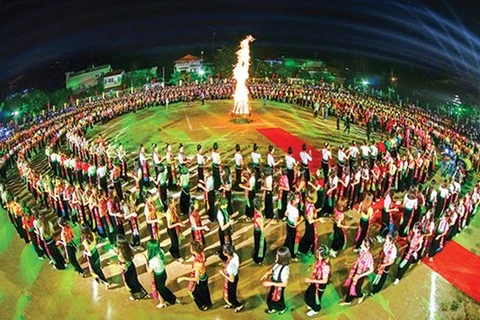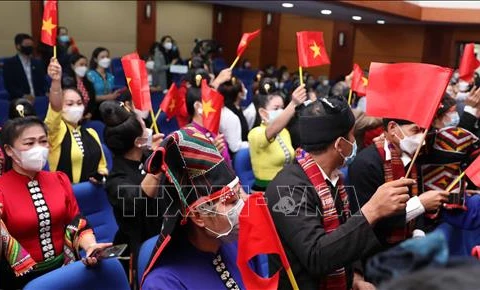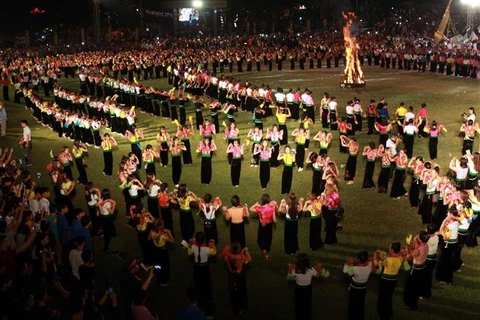Hanoi (VNA) – Right after UNESCO’s official listing of the art of Xoe dance of Thai ethnic minority people in Vietnam as an Intangible Cultural Heritage of Humanity on December 15, the Ministry of Culture, Sports and Tourism has joined Yen Bai, Lai Chau, Dien Bien, and Son La provinces to celebrate the significant event.
The accreditation took place at the 16th session of the UNESCO Intergovernmental Committee for the Safeguarding of the Intangible Cultural Heritage, scheduled for December 13-18.
Xoe is a unique type of traditional dance that is associated with and plays a significant role in the daily life of Thai ethnic communities in the northwest of Vietnam, especially in the provinces of Lai Chau, Dien Bien, Son La and Yen Bai. It is performed in various community activities from festivals to funeral rituals.
Deputy Minister of Culture, Sports and Tourism Hoang Dao Cuong expressed his delight and pride when the Thai people’s Xoe dance has become the 14th intangible heritage of Vietnam to obtain the UNESCO title so far.
He said this is an international affirmation and recognition of Vietnam’s rich, diverse and distinctive cultural heritage.
Echoing Cuong’s view, Secretary of the Yen Bai provincial Party Committee Do Duc Duy said the art carries a message of openness, hospitality, and solidarity. He informed that the preservation and promotion of the art have been conducted since the 1990s by authorities and Thai communities in the four provinces. They have so far established some 3,300 troupes to regularly practice the dance within the communities, and introduced it via publications and cultural projects, and at school, among other activities.
The official said after the recognition, Yen Bai will work with Son La, Dien Bien and Lai Chau to organise a ceremony to welcome the accreditation next year, implement a related action plan as committed to UNESCO, and make proposals on specific projects and plans serving the protection of the art.
Artisan Lo Van Bien from Yen Bai’s Nghia Lo township, who has spent many years researching and preserving the art, said he is filled with happiness and pride.
Expressing his gratitude toward the attention paid by the Party, State, cultural sector, and local authorities toward the conservation of the heritage, he vowed to further making contributions to the work via introducing and teaching the dance.
There are about 30 Xoe dances, which have been developed, protected and handed down through generations intact over hundreds of years, including xoe quat (xoe dance with a fan), xoe khan (xoe dance with a scarf), xoe non (xoe dance with a conical hat) and many others with contents reflecting community activities and expressing the Thai people’s emotion. With gentle and alluring rhythms, dancers usually form a circle around a festive flame and move to the sound of melodic traditional music.
Xoe dance has become a symbol of hospitality of Thai people and an important cultural imprint of the community in the northwestern mountainous region.
The recognition of the art as an Intangible Cultural Heritage of Humanity affirms Vietnam’s diverse cultural identities as well as the close bonds of the community and the country’s respect for cultural diversity. Moreover, the title is expected to help raise the world’s awareness of the Intangible Cultural Heritages in general and the art of Xoe dance of Vietnam in particular./.
The accreditation took place at the 16th session of the UNESCO Intergovernmental Committee for the Safeguarding of the Intangible Cultural Heritage, scheduled for December 13-18.
Xoe is a unique type of traditional dance that is associated with and plays a significant role in the daily life of Thai ethnic communities in the northwest of Vietnam, especially in the provinces of Lai Chau, Dien Bien, Son La and Yen Bai. It is performed in various community activities from festivals to funeral rituals.
Deputy Minister of Culture, Sports and Tourism Hoang Dao Cuong expressed his delight and pride when the Thai people’s Xoe dance has become the 14th intangible heritage of Vietnam to obtain the UNESCO title so far.
He said this is an international affirmation and recognition of Vietnam’s rich, diverse and distinctive cultural heritage.
Echoing Cuong’s view, Secretary of the Yen Bai provincial Party Committee Do Duc Duy said the art carries a message of openness, hospitality, and solidarity. He informed that the preservation and promotion of the art have been conducted since the 1990s by authorities and Thai communities in the four provinces. They have so far established some 3,300 troupes to regularly practice the dance within the communities, and introduced it via publications and cultural projects, and at school, among other activities.
The official said after the recognition, Yen Bai will work with Son La, Dien Bien and Lai Chau to organise a ceremony to welcome the accreditation next year, implement a related action plan as committed to UNESCO, and make proposals on specific projects and plans serving the protection of the art.
Artisan Lo Van Bien from Yen Bai’s Nghia Lo township, who has spent many years researching and preserving the art, said he is filled with happiness and pride.
Expressing his gratitude toward the attention paid by the Party, State, cultural sector, and local authorities toward the conservation of the heritage, he vowed to further making contributions to the work via introducing and teaching the dance.
There are about 30 Xoe dances, which have been developed, protected and handed down through generations intact over hundreds of years, including xoe quat (xoe dance with a fan), xoe khan (xoe dance with a scarf), xoe non (xoe dance with a conical hat) and many others with contents reflecting community activities and expressing the Thai people’s emotion. With gentle and alluring rhythms, dancers usually form a circle around a festive flame and move to the sound of melodic traditional music.
Xoe dance has become a symbol of hospitality of Thai people and an important cultural imprint of the community in the northwestern mountainous region.
The recognition of the art as an Intangible Cultural Heritage of Humanity affirms Vietnam’s diverse cultural identities as well as the close bonds of the community and the country’s respect for cultural diversity. Moreover, the title is expected to help raise the world’s awareness of the Intangible Cultural Heritages in general and the art of Xoe dance of Vietnam in particular./.
VNA
























